 |
back ||
next |
| Though the daily routine was austere, cadets did enjoy certain annual
entertainments. In addition to sports, prize drills and competitions, and the social
events they shared with young ladies of Sherman Female Institute, North Texas Female
College, and Carr-Burdette College, the cadets were usually permitted to attend the Dallas
Fair each October. On October 1, 1891, the Dallas Fair Committee reported to the faculty
that cars (railroad) could be secured at the rate of $1.90 per capita, round-trip. Cadets
attended as a body. More spontaneous amusements included snowball fights and squirrel
hunting. In the fall of 1896, The Reveille reported that
"squirrel hunting on the campus [had] begun again and every evening after drill the
usual number of gunners [might] be seen." |
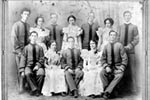
Cadets and Girls
[ large image ] |
|
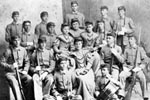
Cadets and Sponsors
[ large image ] |
Each cadet company was allowed to choose sponsors and maids of honor. The
ladies hostessed parties and soirees during the year and a gala reception for their
respective companies each spring. The girls’ schools in town were, if anything,
stricter even than the military discipline at Austin College, but joint programs did take
place, and the sexes did find opportunities to mingle under the watchful eyes of the
faculties of the various schools. |
|
| Military rank was based on several factors including academic standing,
dependability, behavior, and the willingness to assume the duties and responsibilities of
a cadet officer. Prestige definitely had its price. When it came to enforcing discipline
among fellow cadets, battalion officers sometimes found themselves distinctly unpopular. Violations
of the articles of discipline were punishable by "marking time" (referred to by
cadets as "hitting the grit") or "doing time" in the guard house.
Cadets sentenced to the guardhouse might spend a few hours or a couple of days there,
depending on the severity of the offense. If confined for a day, the prisoner might
receive bread and water only or no meals at all. If confined more than one day, only one
meal per day was provided. |
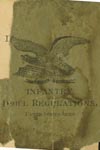 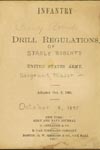
[ large image ] [ large image ]
Drill book
|
|
|
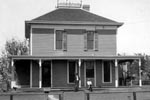
Old Bailey
[ large image ] |
The community played an integral role in the lives of the college and its
cadets. Although cadets were required to live on the campus, reality dictated that many
live elsewhere as dormitory rooms weren’t plentiful. Many families near the campus
housed one or more Austin College cadets each term. However, as the numbers of students
grew, the cadets sought rooms in the town as well as on College Hill. Some cadets
requested and received permission from the faculty to live in hotels like the Binkley, or
the American Hotel across from Union depot, where they worked for room and board. All
heads of households where cadets resided received instructions from the faculty as to what
was expected of them and of the cadets. Those who did not comply were placed "off
limits." |
|
| At the faculty meeting on May 18, 1893, it was ordered that the following
year all students be provided with a Bible and a hymnbook--Gospel Hymns Nos. 5 &
6--for use at Chapel services, which all students were required to attend. |
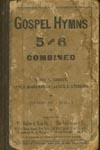
Hymnbook No. 5&6
[ large image ] |
|
|
|
back || next |